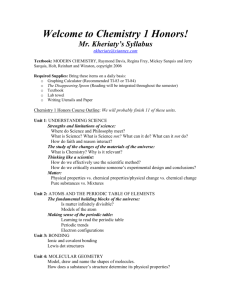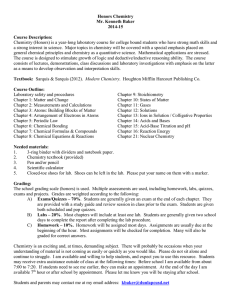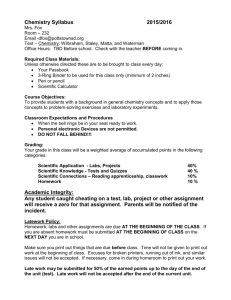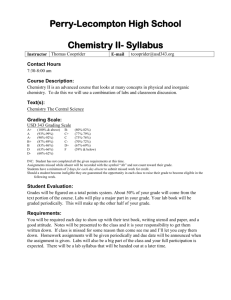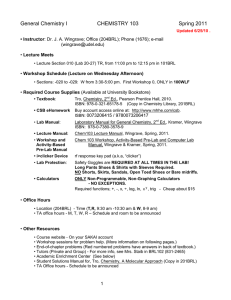Chemistry Syllabus - Sayre Public Schools
advertisement
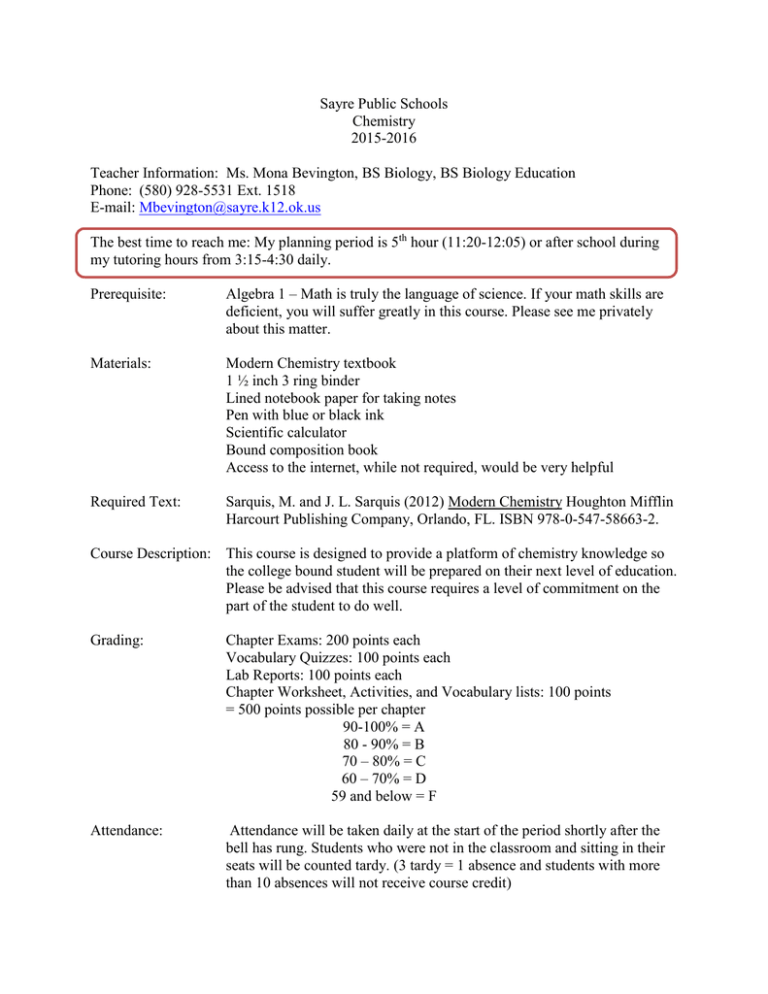
Sayre Public Schools Chemistry 2015-2016 Teacher Information: Ms. Mona Bevington, BS Biology, BS Biology Education Phone: (580) 928-5531 Ext. 1518 E-mail: Mbevington@sayre.k12.ok.us The best time to reach me: My planning period is 5th hour (11:20-12:05) or after school during my tutoring hours from 3:15-4:30 daily. Prerequisite: Algebra 1 – Math is truly the language of science. If your math skills are deficient, you will suffer greatly in this course. Please see me privately about this matter. Materials: Modern Chemistry textbook 1 ½ inch 3 ring binder Lined notebook paper for taking notes Pen with blue or black ink Scientific calculator Bound composition book Access to the internet, while not required, would be very helpful Required Text: Sarquis, M. and J. L. Sarquis (2012) Modern Chemistry Houghton Mifflin Harcourt Publishing Company, Orlando, FL. ISBN 978-0-547-58663-2. Course Description: This course is designed to provide a platform of chemistry knowledge so the college bound student will be prepared on their next level of education. Please be advised that this course requires a level of commitment on the part of the student to do well. Grading: Chapter Exams: 200 points each Vocabulary Quizzes: 100 points each Lab Reports: 100 points each Chapter Worksheet, Activities, and Vocabulary lists: 100 points = 500 points possible per chapter 90-100% = A 80 - 90% = B 70 – 80% = C 60 – 70% = D 59 and below = F Attendance: Attendance will be taken daily at the start of the period shortly after the bell has rung. Students who were not in the classroom and sitting in their seats will be counted tardy. (3 tardy = 1 absence and students with more than 10 absences will not receive course credit) Course Objectives: The course will follow the chapter layout in the textbook. In chemistry, one concept builds on the next, so skipping chapters is difficult. Fall 2015 1 2 3 4 5 6 7 8 9 10 Matter and change Measurements & calculations Atoms: the building blocks Arrangement of electrons The periodic law Chemical bonding Chemical formulas Chemical equations Stoichiometry States of matter Late Work Policy: Spring 2016 11 12 13 14 15 16 17 18 19 20 Gases Solutions Ions in aqueous solutions Acids and bases Acid-base titration & pH Reaction energy Reaction kinetics Chemical equilibrium Oxidation-reduction reaction Electrochemistry Late work will be accepted with a 10% per day penalty to the point that graded work is returned. After that, no late work will be accepted. Missed Exams with a valid excuse will be made up at an arranged time. Missed Labs are not able to be made up. One cannot work alone in the lab, and it is too difficult to reset a lab for one student. Please visit with me about any missed labs. Academic Offenses: Students are expected to engage in academic pursuits in a manner that is above reproach. Students are expected to maintain honesty and integrity both in and out of the classroom. The two main types of academic dishonesty are cheating and plagiarizing. Students found guilty of these offenses will be subject to the following disciplinary actions: Cheating on an exam or other academic work – to include copying from another student’s test paper, lab report, or homework assignment using materials not authorized by the teacher, or collaborating with another without authorization – will result in a zero (0). Allowing another person access to your ideas, exam answers, or academic work is also considered cheating and will result in a zero (0). Use of any technology such as cell phones, computers, I pads or tablets during an exam will result in a zero(0). Plagiarizing: To plagiarize is to “pass off ideas or words of another’s as one’s own created production without crediting the source; to present as new and original an idea or product derived from an existing source.” (Webster) Plagiarism applies to anything produced by a student to be graded in the course. (i.e., papers, posters, term papers, books and all forms or reports, take home exams, essays, journals, and oral presentations) All forms of plagiarism will result in a zero (0). The Goals of a Flipped Classroom During this course, we will try the flipped classroom concept. Students will be assigned podcasts to watch, textbook readings, and prelab assignments. The classroom time will be used to discuss and clarify the assigned material, work selected problems together as a class, and do lab investigations. The advantage of a flipped classroom is that it allows students the chance to reflect on and articulate their thinking with peers which experts regard as an essential part of how people learn (Bransford et al., 2000; Vygotsky, 1986), Students will be expected to prepare in advance for classroom discussions by reading selected text passages, writing Cornell style notes, and viewing various assigned podcasts.

